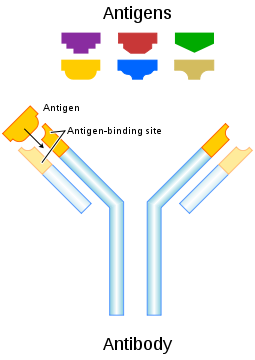
Anti-centromere antibodies
Encyclopedia

Centromere
A centromere is a region of DNA typically found near the middle of a chromosome where two identical sister chromatids come closest in contact. It is involved in cell division as the point of mitotic spindle attachment...
antibodies (ACA) occur in auto immune disorders; frequently in limited systemic scleroderma
CREST syndrome
The limited cutaneous form of systemic scleroderma is often referred to as CREST syndrome. "CREST" is an acronym for the five main features:* Calcinosis* Raynaud's syndrome* Esophageal dysmotility* Sclerodactyly* Telangiectasia...
, (formerly called CREST Syndrome), and, occasionally are found in the diffuse form of scleroderma. They are rare in other rheumatic conditions and in healthy persons.
Anti-centromere antibodies are found in approximately 60% of patients with limited systemic scleroderma, and in 15% of those with diffuse form of scleroderma. The specificity of this test is >98%. Thus, a positive anticentromere antibody finding is strongly suggestive of limited systemic scleroderma. Anti-centromere antibodies present early in the course of disease, and is notably predictive of limited cutaneous involvement and a decreased likelihood of aggressive internal organ involvement, such as lung fibrosis.
When present in primary biliary cirrhosis
Primary biliary cirrhosis
Primary biliary cirrhosis, often abbreviated PBC, is an autoimmune disease of the liver marked by the slow progressive destruction of the small bile ducts within the liver. When these ducts are damaged, bile builds up in the liver and over time damages the tissue. This can lead to scarring,...
, ACA are prognostic of portal hypertension.

